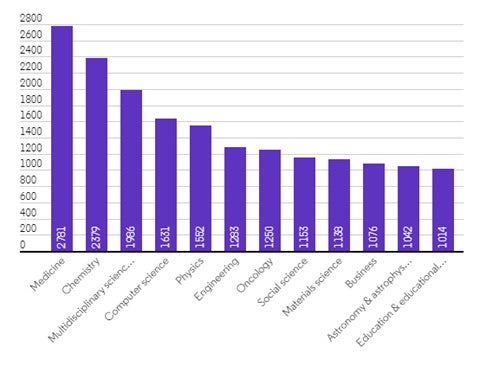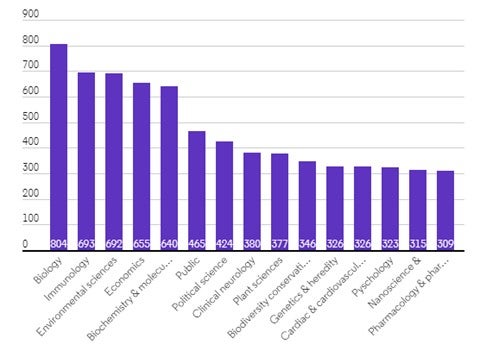There are more than 65,000 early career researchers in Ukraine. In this blog post, we spotlight the young scientists in the country and the disciplines in which they work. As the devastating effects of the war there continue, the future of research in Ukraine is uncertain.
Continued escalation of conflict in Ukraine has halted much of the country’s research, as many academics have been displaced and others tragically killed or or missing[1]. Further, early career researchers (graduate level students or postdoctoral students who are at the beginning of their careers) may be more likely to be of the age to join the military and support combat-related efforts. Those who continue their research, whether within Ukraine or while displaced, may encounter issues with accessing their institution’s equipment and resources.
We cover this topic below and in our Ideas to Innovation podcast. Listen here for more.
Why are early career researchers so important?
A vast amount of scientific research is conducted by early career researchers (ECRs). They bring talent, skills and ideas to the academic workforce, and research shows they are considerably more diverse when it comes to gender and ethnicity than researchers more advanced in their careers. What’s more, ECRs will eventually become the leaders in their respective fields. Nurturing their development and ensuring they can learn from and progress the work of others in a safe environment is critical to the future of research in Ukraine and elsewhere.
“As can be seen, the numbers are staggering, indicating thousands of scientists and researchers at the beginning of their careers potentially unable to pursue their work.”
Ukraine research areas most at risk
In this analysis, we aimed to understand which subject areas might be most affected in Ukraine’s future. To do this, we retrieved all of Ukraine’s publications from the Web of Science™. We then calculated the ‘academic age’ of these authors, which involved looking at the difference between their first and last year of publication. We only selected authors who published an article in 2021 or 2022 with no publications prior to 2021, as this likely indicates a researcher at the onset of their scientific endeavor.
Through this effort, we identified 540 categories that recent early career authors have focused on. Figure 1 shows the top 12 categories that more than 1,000 early career researchers contribute to.
[bctt tweet=”In #Ukraine, medicine and chemistry are each studied by more than 2,000 #ECRs. Find out which other #research areas might be most affected in Ukraine’s future by @ClarivateAG”]
Computer science, physics and engineering, among other disciplines, recently benefitted from the focus of over 1,000 early career researchers who managed to publish only one article in 2021 and 2022. Figures 1 and 2 show the number of early career researchers we identified in each discipline.
Figure 1: Top 12 categories with more than 1,000 early career authors

Source: Web of Science™
There are many other disciplines and areas of research that have captured the attention of hundreds of early career scientists including biology, immunology, environmental sciences and more (see figure 2), all likely affected by the lingering war.
Figure 2: Top 15 categories with more than 100 early career authors

Source: Web of Science™
In our previous blog we discussed the immense contributions of Ukrainian researchers to the United Nations Sustainable Development Goals (SDGs). For example, we were able to show Ukrainian researchers had published 5,863 scientific publications towards the SDGs since 2017, which include 1,728 papers focusing on SDG-3: Good Health and Well-Being and 545 papers focusing on SDG-5: Gender Equality. Given the lingering war, the future of these areas of research and development is also in jeopardy.
Global efforts to support Ukrainian early career researchers
Many research institutions around the world are supporting Ukrainian early career researchers by offering fellowships, scholarships, visiting researcher status and employment for displaced young scientists.
Science for Ukraine is an example of a global effort to coordinate support for displaced scientists. This organization connects research institutions with Ukrainian scientists to support temporary solutions for those who are seeking refuge and ways to continue their scientific pursuits.
Another recently launched effort are FEMS (Federation of European Microbiology Societies) grants that aim to enable Early Career Microbiologists to undergo research and training at a European host institution (academic or industrial). The European Council of Doctoral Candidates and Junior Researchers (Eurodoc) also created a special task force within Eurodoc that is dedicated to supporting doctoral candidates and junior researchers.
However, although there are many emerging support systems in place, they can be difficult for young scientists to access. Because the Ukrainian government prevents males under 60 from leaving the country (an effort to continue national protection efforts), these early career scientists are in both physical and professional danger.
Clarivate™ is also supporting displaced researchers with a dedicated resource center that provides a package of software tools, information and insights.
See the Clarivate resource center for displaced researchers here, or read our other articles about Ukrainian innovation and contributions to the UN Sustainable Development Goals. You can also listen to our podcast on the series, here.
About the author
Gali Halevi is Director at the Institute for Scientific Information. Previously she was Associate Dean of Libraries & Information Sciences at the Icahn School of Medicine at Mount Sinai and the Mount Sinai Health System. She has a background in bibliometrics and has worked in academic publishing and as an information specialist for pharmaceutical and financial companies.
ORCiD 0000-0003-1967-4147 ; Web of Science ResearchID AAD-2257-2021
[1] https://sciencebusiness.net/news/ukrainian-researchers-navigate-times-war





